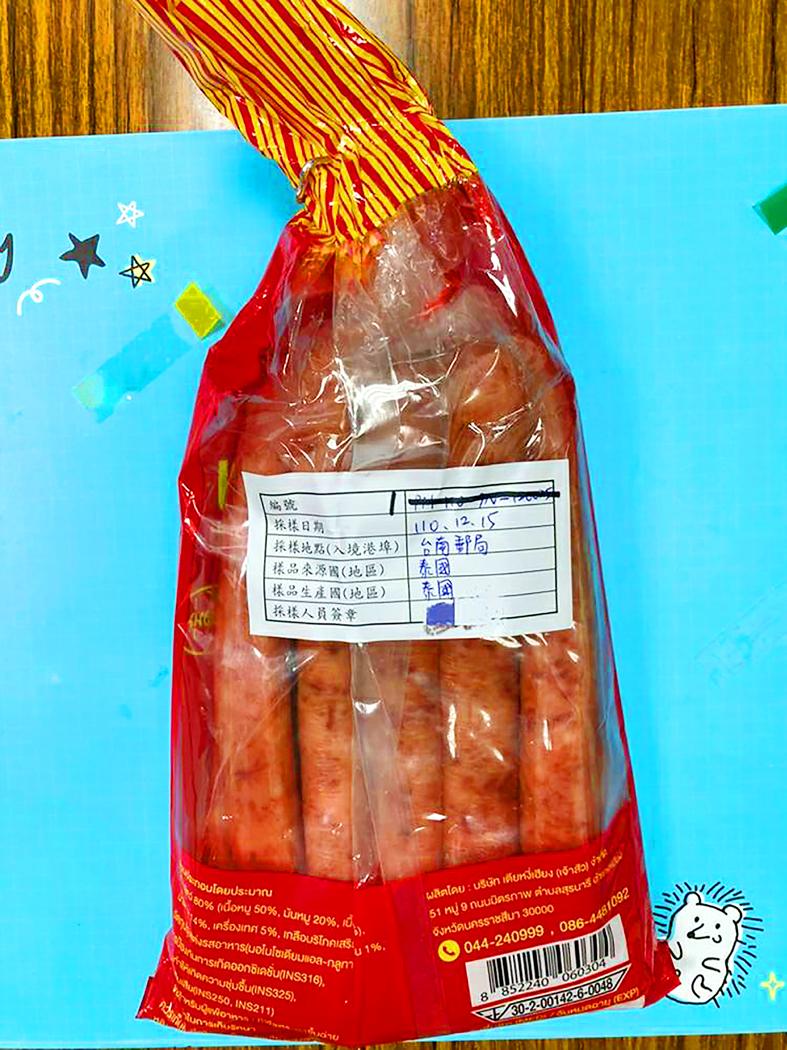Sausages in an intercepted package from Thailand were confirmed to have the African swine fever virus, the Central Emergency Operation Center (CEOC) said on Thursday.
The Council of Agriculture’s (COA) Bureau of Animal and Plant Health Inspection and Quarantine, which oversees the center, said that a package was flagged by a post office in Tainan on Wednesday last week after it was found to contain sausages.
A laboratory test on Friday last week revealed that the meat carried the African swine fever virus.

Photo courtesy of the Bureau of Animal and Plant Health Inspection and Quarantine via CNA
The sausages tested positive again in a confirmation test at a bureau laboratory on Wednesday.
It is the first time that African swine fever has been detected in pork products from Thailand, the CEOC said.
Although pork products found in the luggage of a Thai traveler three months ago had been determined to have the virus, it was unclear if the food originated from Thailand, as there was no labeling, and because the person had entered from China, the COA said.
The bureau said that Thailand has yet to report any African swine fever cases to the World Organization for Animal Health (OIE).
The intercepted package would be returned to Thailand, with the case reported to the nation’s OIE representative, the center said.
As some of Thailand’s neighbors border China, the CEOC anticipated in a 2019 risk assessment that the virus would eventually make its way to the country through Southeast Asia, it said.
Luggage, express mail and packages arriving from Southeast Asian countries have been subjected to detailed inspections, including with X-rays, upon entry into Taiwan, the bureau said.
Taiwanese should refrain from receiving pork products from other countries, especially considering their popularity during the Lunar New Year period, as packages containing these products must be handed to a bureau-sanctioned agency to be destroyed, the CEOC said.
Under the Act for Prevention and Control of Infectious Animal Disease (動物傳染病防治條例), those who do not comply with regulations could be fined from NT$30,000 to NT$150,000, the CEOC said.
The African swine fever pandemic remains a serious concern in Asia, with the virus having been found in Bhutan, Cambodia, China, India, Indonesia, Laos, Malaysia, Mongolia, Myanmar, North Korea, the Philippines, South Korea, Timor-Leste, South Korea and Vietnam, it added.

Trips for more than 100,000 international and domestic air travelers could be disrupted as China launches a military exercise around Taiwan today, Taiwan’s Civil Aviation Administration (CAA) said yesterday. The exercise could affect nearly 900 flights scheduled to enter the Taipei Flight Information Region (FIR) during the exercise window, it added. A notice issued by the Chinese Civil Aviation Administration showed there would be seven temporary zones around the Taiwan Strait which would be used for live-fire exercises, lasting from 8am to 6pm today. All aircraft are prohibited from entering during exercise, it says. Taipei FIR has 14 international air routes and

Taiwan lacks effective and cost-efficient armaments to intercept rockets, making the planned “T-Dome” interception system necessary, two experts said on Tuesday. The concerns were raised after China’s military fired two waves of rockets during live-fire drills around Taiwan on Tuesday, part of two-day exercises code-named “Justice Mission 2025.” The first wave involved 17 rockets launched at 9am from Pingtan in China’s Fujian Province, according to Lieutenant General Hsieh Jih-sheng (謝日升) of the Office of the Deputy Chief of the General Staff for Intelligence at the Ministry of National Defense. Those rockets landed 70 nautical miles (129.6km) northeast of Keelung without flying over Taiwan,

The Ministry of National Defense (MND) today released images of the military tracking China’s People's Liberation Army (PLA) movements during the latest round of Chinese drills around Taiwan. The PLA began "Justice Mission 2025" drills today, carrying out live-fire drills, simulated strikes on land and maritime targets, and exercises to blockade the nation's main ports. The exercises are to continue tomorrow, with the PLA announcing sea and air space restrictions for five zones around Taiwan for 10 hours starting from 8:30am. The ministry today released images showing a Chinese J-16 fighter jet tracked by a F-16V Block 20 jet and the

City buses in Taipei and New Taipei City, as well as the Taipei MRT, would on Saturday begin accepting QR code payments from five electronic payment providers, the Taipei Department of Transportation said yesterday. The new option would allow passengers to use the “transportation QR code” feature from EasyWallet, iPass Money, iCash Pay, Jkopay or PXPay Plus. Passengers should open their preferred electronic payment app, select the “transportation code” — not the regular payment code — unlock it, and scan the code at ticket readers or gates, General Planning Division Director-General Liu Kuo-chu (劉國著) said. People should move through the